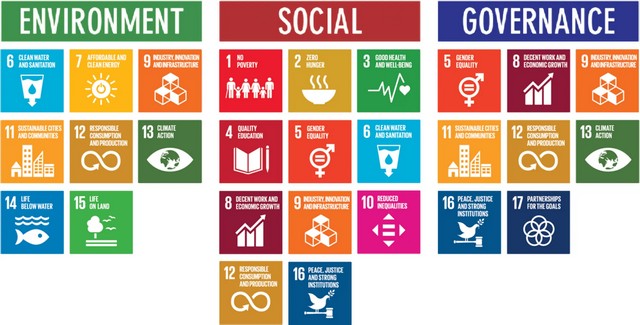In recent years, skills development, particularly among youth, has become a major policy priority for many national governments, including Malaysia. This shift is driven by various factors, such as persistent youth unemployment, skills mismatch, and the evolving nature of employment due to globalisation and technological advancement. Moreover, global challenges like climate change, food security, and poverty eradication have intensified the need for innovative solutions and skilled individuals to tackle these issues.
This rapid transformation has led to reforms in national skills development systems, amplifying the role of skills in employability and lifelong learning. Furthermore, a growing number of “sustainability jobs,” often classified as Environmental, Social, and Governance (ESG) roles, have emerged. These jobs align with the global agenda to reduce environmental impact, promote sustainable practices, and drive positive social change. ESG roles resonate strongly with the Sustainable Development Goals (SDGs), as both aim to achieve a more sustainable future.
What are the SDGs?
At a special United Nations summit in September 2015, world leaders adopted a new vision for global development: “Transforming Our World: The 2030 Agenda for Sustainable Development.” This agenda laid the groundwork for the 17 Sustainable Development Goals (SDGs), which serve as a blueprint for a better and more sustainable future. These goals address various global challenges, ranging from hunger and gender equality to clean energy and climate action.
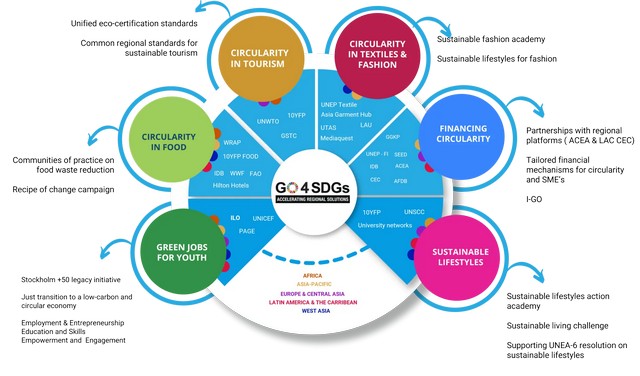
A key component of the 2030 Agenda is the Decent Work Agenda by the International Labour Organisation (ILO), which emphasises that decent work is both a means and an end to sustainable development. The promotion of better and more sustainable jobs cuts across many of the SDGs, which prompted the establishment of Global Opportunities for Sustainable Development Goals (GO4SDGs) in 2019 as a dynamic platform that supports SDG implementation by connecting global partnerships with regional needs.
The platform focuses particularly on achieving SDG 12: Responsible Consumption and Production and SDG 8: Decent Work and Economic Growth. Through policy coherence, innovation support for small and medium-sized enterprises (SMEs), and youth empowerment, GO4SDGs helps turn knowledge into action across key sectors like food systems, textiles, and tourism, which directly addressed other aspects of SDG as well.
Some of the flagship initiatives include:
- Green Jobs for Youth Pact: Accelerating regional implementation in Africa, Asia-Pacific, Central Asia and Europe, West Asia, and Latin America and the Caribbean. This is through fostering regional partnerships, responding to regional priorities, and leveraging existing tools, guidelines and knowledge from pact partners (UNEP, ILO and UNICEF).
- Sustainable Lifestyles: Supporting implementation of the UNEA 6 Resolution on “Promoting Sustainable Lifestyles.” through tools like the Sustainable Lifestyles Academy and promoting sustainable lifestyles in education through regional networks such as ARIUSA and Central Asia’s Sustainable Lifestyle University Network
- Circularity in Food: Increasing regional capacities and initiatives on food systems and waste reduction through the recipe of change campaign and regional working groups on food waste reduction.
- Circularity in Textiles: Building capacity for designers and stakeholders to promote circularity in the fashion and textile sector through the West Asia Sustainable Fashion Academy (WASFA) and the Sustainable fashion communication playbook
- Finance for Innovation and Circular Economy: Strengthening partnerships and scaling up innovation and financial mechanisms in Africa, Central Asia, and Latin America and the Caribbean. This work includes a finance-ecosystem pilot project to promote resource efficiency and cleaner production (RECP) in SMEs operating in the dairy and tea value chains in Kenya. In partnership with UNEP-FI, GO4SDGs has launched the Principles of Responsible Banking training Central Asian banks.
- Circularity in Tourism: Raising ambition on standards and certification for sustainable tourism in Africa and Central Asia.
These initiatives showcase how collaboration and innovation are key to advancing sustainable practices and opening up new career opportunities across multiple sectors.
Sarawak’s Development In Alignment with SDG
Sarawak is similarly emerging as a leader in the transition toward a sustainable future by leveraging its abundant natural resources and developing cutting-edge industries. The state’s initiatives are particularly focused on renewable energy, including hydrogen production, hydropower, and Sustainable Aviation Fuel (SAF) derived from algae. This progress is supported by the Sarawak government’s transformation of its education system to meet industry demands in these sectors, with institutions such as i-CATS University College, Swinburne University of Technology Sarawak, University Technology Sarawak (UTS), and CENTEXS playing a pivotal role.
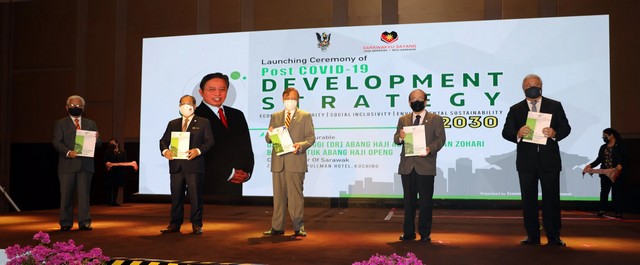
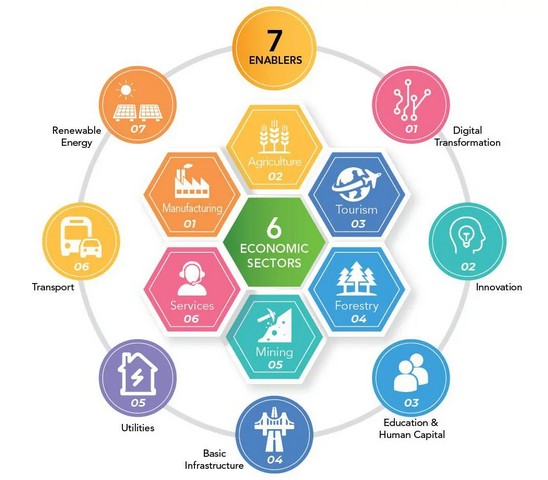
The Sarawak government’s Post COVID-19 Development Strategy 2030 also serves as a framework for SDG implementation. This strategy emphasises green economy growth, climate action, and socioeconomic inclusion. The development of green technologies like electric vehicles and biofuels, paired with Sarawak’s efforts to deliver energy to underserved communities, underscores its role as a model for SDG progress.
Moreover, Sarawak is investing in localised SDG strategies, including the SDG Cities Roadmap, to align local policy responses with global goals. This roadmap provides guidelines for local authorities to implement sustainable practices at the community level, promoting inclusivity and sustainable development.
Choosing Careers In Alignment with SDGs
It is clear that today’s youth have a different perspective when it comes to career planning compared to previous generations. With global efforts to achieve the SDGs, there is a growing desire among younger generations for meaningful work that not only provides income but also generates a positive social impact. While new positions will emerge to address these global challenges, many existing jobs can also be aligned with the SDGs.
As such, the Perception Change Project aspires to broaden the global understanding and the importance of the work done by the international actors. The initiative emphasises that nearly every profession can contribute to at least one of the SDGs, demonstrating that even everyday tasks can make a difference. Jobs that align with sustainability goals help build a better future and provide individuals with a sense of purpose. To achieve these and other SDGs, ESG (Environmental, Social, and Governance) professionals, also known as “goalkeepers,” play a vital role.
The Perception Change Project (PCP) further expanded on the SDGs by introducing initiatives like the “170 Daily Actions to Transform Our World” and the booklet “170 Jobs with a Purpose”, showcasing how ordinary tasks can contribute to achieving the SDGs:
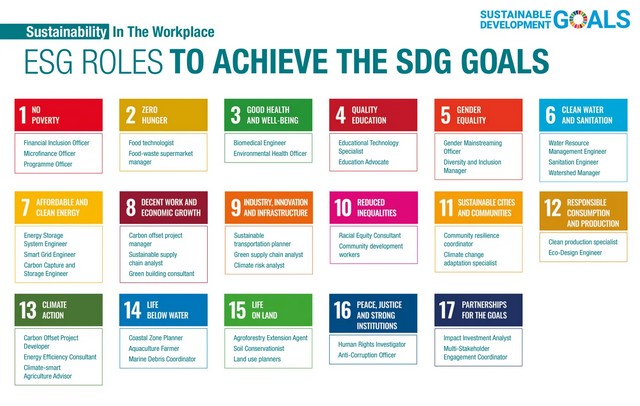
Sarawak’s efforts towards achieving the Sustainable Development Goals (SDGs) reflect a broader global commitment, with numerous career opportunities tied to these aspirations. Whether it’s addressing inequalities, building sustainable cities, fostering responsible consumption, or combating climate change, each of these roles plays a vital part in driving sustainable progress. By pursuing careers in these fields, Sarawak’s youth have the power to make a meaningful impact on their communities and the world at large. Every contribution counts, and with each step forward, we move closer to realising our shared goals for a better, more sustainable future.
References
- “Transforming our world: The 2030 agenda for sustainable development — Resolution adopted by the United Nations General Assembly”
- “International Labour Organisation — SDG note: Skills for employment”
- “International Journal of Training Research: Skills, employability and lifelong learning in the Sustainable Development Goals and the 2030 labour market”
- “From SDGs to ESG roles: How to find a job that impacts the world”
- “170 Jobs with a Purpose”
- “GO4SDGs: Accelerating Regional Solutions”
- “Resident Coordinator’s speech: SDG Summit 2023 – Sarawak Region”
- “RM1.4 mln for councils to achieve the SDG targets”
- “Malaysia SDG Summit 2024: Achieving Sustainable Development Goals through education”


